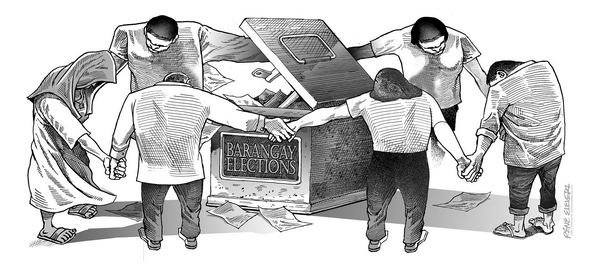
Aweek from now, voters across the Philippines will choose the new set of barangay and barangay youth councilors.
In the runup to the polls, it is incumbent upon candidates and voters to remember clearly the role of the barangay in our socio-political life.
The barangay is not the smallest geographical arena in the country for displays of personal vanity.
It is not the stage on which to showcase the tribalism of neighbors in the contention for power.
It is not just a small locale to establish one’s address for identification and other documentary purposes.
“As the basic political unit,” the Local Government Code states, “the barangay serves as the primary planning and implementing unit of government.”
The Code also states that the barangay is “a forum wherein the collective views of the people may be expressed, crystallized and considered, and where disputes may be amicably settled.”
We need barangay officials who live up to the ideals of this small locale as stipulated in the law, barangay chairpersons and officials who bring to fruition in the neighborhoods the promises of the larger units of the government from Malacañang all the way to the city or municipality.
This means officials in larger government units should refrain from partisanship that would hobble the delivery of basic services in the barangays.
Barangays should further be shielded from partisanship to preserve its status as an avenue for amicable dispute settlement, to protect it from violence.
For their part, voters should throw their support behind candidates who are ready and willing to fulfill their mandates.
Being a barangay chair alone is a tall order. The law mandates her or him not only to enforce laws and ordinances applicable to the barangay.
It also mandates the chair to prepare annual budgets, maintain peace and order, control pollution and protect the environment, supervise the activities of the barangay youth council, organize annual sports festivals, and maintain a barangay-based justice system.
Barangay councilors have their own set of responsibilities ranging from enacting budgets for barangay projects and to pay personnel to regulating the use of barangay facilities.
Votes should go to candidates who evince honesty, accountability, participatory governance, integrity and transparency.
In the words of the prayer Philippine Catholic bishops released for the elections, we need “men and women who will work for truth, justice, and the upliftment of human dignity,” who will lead citizens to “give a voice to the poor, the powerless, the abandoned, and the oppressed.”
Disclaimer: The comments uploaded on this site do not necessarily represent or reflect the views of management and owner of Cebudailynews. We reserve the right to exclude comments that we deem to be inconsistent with our editorial standards.
